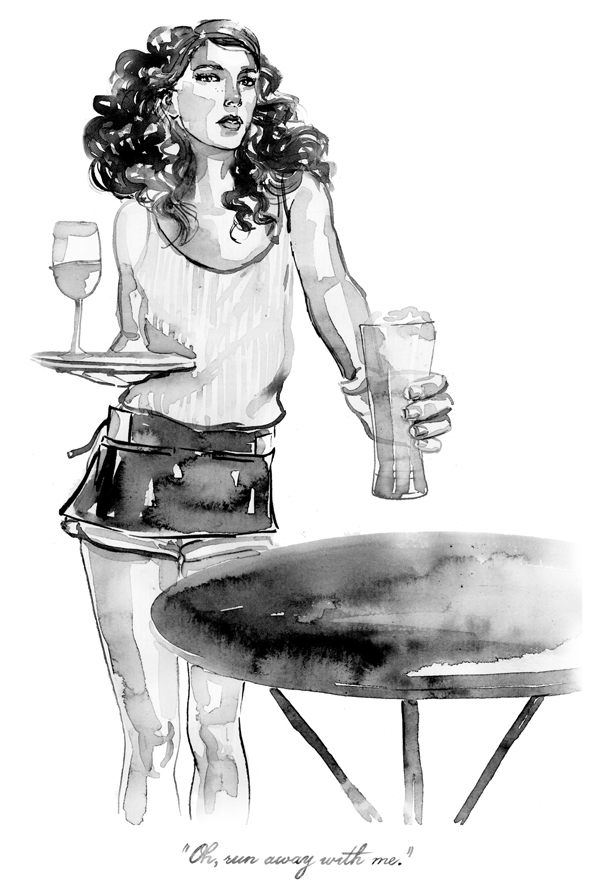What’s in our Winter issue? The first work of fiction by J. D. Daniels; the first installment of a novel by Rachel Cusk; interviews with Geoff Dyer and Edward P. Jones; fiction by Jenny Offill, Nell Freudenberger, Ottessa Moshfegh, and Lydia Davis; and a portfolio of nudes by Chuck Close. And we haven’t even put the issue to bed yet!
Enjoy the preview below—and subscribe today to receive a full year of The Paris Review.

Illustration by Samantha Hahn.
___________________________________________________________
Geoff Dyer, The Art of Nonfiction No. 6
INTERVIEWER
What was it about D. H. Lawrence that made you want to be a writer?
DYER
Sons and Lovers in some ways described the process I would undergo—growing up in a working-class family, albeit a very different one from Lawrence’s, and beginning a process that would lead to growing beyond it. The thing about Lawrence, for me, is that there were other writers whose books I liked but I was sort of in love with him, his intensity. I had pictures of him on my bedroom wall the way kids these days would have pictures of some teen idol or other. The first biography I ever read was Harry T. Moore’s The Priest of Love. This is entirely normal. The thing about Lawrence is that anyone who met him for five minutes would end up writing a memoir about their time with D. H. Lawrence. He would come crashing into people’s lives, and everyone would be overwhelmed by his genius—and then of course there’d be the falling-out. Also, one of the plays we were doing for A-level was John Osborne’s Look Back in Anger. The link from Lawrence to the angry young men of Osborne’s generation is so palpable. I represent the next generation along from that in terms of working-class boys who go to university and develop the inevitable chip-on-shoulder that is such a feature of British life. And mine was the last generation in that straightforward lineage. After me—after mine—it all gets complicated by race as well. And gender. Let’s say Zadie Smith is the representative figure in that regard. Oh, and I would have to make special mention of Raymond Williams in this Lawrence-related genealogy. He was the person who made a process that I had experienced in entirely personal terms understandable in its broader cultural, social, and political meaning.
I want to stress, this is the experience—growing up in a working-class family—that defined me and continues to define me. It’s the core of my being. And it explains, incidentally, a good deal about my love of America.
___________________________________________________________
Magic and Dread
Jenny Offill
I remember the first time I said the word to a stranger. “It’s for my daughter,” I said. My heart was beating too fast, as if I might be arrested.
My plan was to never get married. I was going to be an art monster instead. Women almost never become art monsters because art monsters only concern themselves with art, never mundane things. Nabokov didn’t even fold his umbrella. Vera licked his stamps for him.
Each day when he left for work, I would stare at the door as if it might open again.
The only thing the baby liked was speed. If I took her outside, I had to walk quickly, even trot a little. If I slowed down or stopped, she would start wailing again. It was the dead of winter and some days I walked or trotted for hours, softly singing.
What did you do today, he’d say when he got home from work, and I’d try my best to craft an anecdote out of nothing.
___________________________________________________________
Gramercy Park
Sylvie Baumgartel
The windows around Gramercy have eyes.
We look, they look back.
A brook cut through the swamp.
The Dutch called it Krom Mesje, little crooked knife.
A little body of water is a dagger, a bigger body is a kill.
The Dutch came for beavers and named us all to pieces.
Baghdad is a swamp of killing.
Gramercy is a kill two acres big.
Bombs lit the desert sky like flowers.
The Super Hornet pilot says, It’s lovely,
The only part of the Iraqi girl you can see is her eyes.
It was a perfect home.
The Turks stormed Baghdad and
Decimated the Byzantines.
The winners had better arrows.
Balls of ice fell on the losers.
Inside each ball was a flower.
The flowers in the ice balls looked like eyes.
When you live on Gramercy Park,
You get two keys.
The doorman keeps them both.